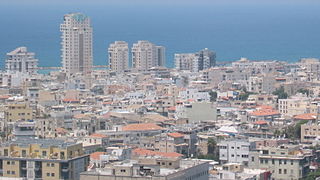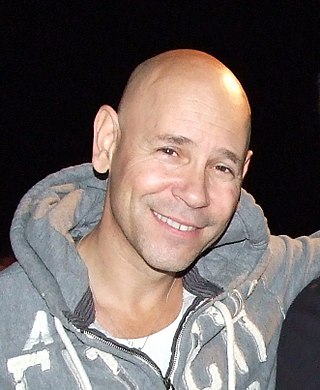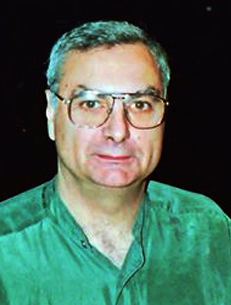
HaGashash HaHiver was an iconic Israeli comedy trio. It was also known as the Gashashim. Its three members were Yeshayahu Levi ("Shaike"), Yisrael Poliakov ("Poli") (deceased) and Gavriel Banai ("Gavri").
The music of Israel is a combination of Jewish and non-Jewish music traditions that have come together over the course of a century to create a distinctive musical culture. For almost 150 years, musicians have sought original stylistic elements that would define the emerging national spirit. In addition to creating an Israeli style and sound, Israel's musicians have made significant contributions to classical, jazz, pop rock and other international music genres. Since the 1970s, there has been a flowering of musical diversity, with Israeli rock, folk and jazz musicians creating and performing extensively, both locally and abroad. Many of the world's top classical musicians are Israelis or Israeli expatriates. The works of Israeli classical composers have been performed by leading orchestras worldwide.

Yehoram Gaon is an Israeli singer, actor, director, comedian, producer, TV and radio host, and public figure. He has also written and edited books on Israeli culture.

Kerem HaTeimanim is a neighborhood in the center of Tel Aviv, Israel. The neighborhood is adjacent to the Carmel Market.
The baqashot are a collection of supplications, songs, and prayers that have been sung by the Sephardic Syrian, Moroccan, and Turkish Jewish communities for centuries each week on Shabbat mornings from the early hours of the morning until dawn. They are usually recited during the weeks of winter, from the Jewish festival of Sukkot through Purim, when the nights are much longer. The baqashot services can last for three to four hours. The Ades Synagogue in Jerusalem is the center of the Syrian practice today, and communities in Ashdod and Montreal are the center of the Moroccan practice.

Batzal Yarok (Hebrew: בצל ירוק was an Israeli theatre and entertainment troupe founded in 1957 by ex-members of the IDF army ensemble, Lahakat Hanahal.

Shalom Hanoch is an Israeli rock singer, lyricist and composer.

Shir LaShalom is a popular Israeli song that has become an anthem for the Israeli peace movement.

Haim Moshe, born 20 September 1955 is an Israeli singer whose musical style has crossed over from Yemenite and Mediterranean "ethnic" music to include mainstream Israeli and western pop elements. He has helped Mizrahi music achieve wide popularity both in Israel and in Arab countries.
Louis Harry Danto was a lyric tenor and cantor. He was acclaimed for his cantorial music, concert appearances and recordings of Italian, Russian, and French opera repertoire. Danto performed throughout North America, Europe and Israel, and recorded 24 solo albums.
"Kuando el rey Nimrod" is a Sephardic folk song. It is sung in the Judaeo-Spanish language and tells the story of the birth of Abraham, the father of the Jewish people and of monotheism.

Shokolad, Menta, Mastik was an Israeli female musical trio, active in the 1970s, composed of Yardena Arazi, Ruthie Holzman and either Tami Azaria (1972-1973) or Leah Lupatin. All the women served in the IDF as part of the Nahal Ensemble. The trio performed both in Israel and internationally, especially after being the 1976 entry to the Eurovision Song Contest in The Hague with "Emor Shalom". Leah Lupatin later worked with Eurovision winners Milk and Honey, replacing Gali Atari to perform 1979 winning Eurovision entry "Hallelujah" in live concerts, including the 1981 Songs of Europe programme.

Rami Kleinstein is an Israeli singer and composer.

Avihu Medina is an Israeli composer, arranger, songwriter, and singer of Mediterranean Israeli music.
Alexander "Sasha" Argov was a prominent Israeli composer.

Yair Rosenblum was an Israeli composer and arranger.

NaomiPolani is an Israeli musical director, theater director, singer, producer, actress and dancer. She was the Israel Prize laureate for Theater and Dance in 2019.
Assaf Shelleg is an Israeli-American musicologist and pianist, a senior lecturer of musicology at The Hebrew University of Jerusalem. He was previously the Schusterman Visiting Assistant Professor of Musicology and Jewish Studies in the Department of Religious Studies at the University of Virginia (2011–2014), and had taught prior to that as the visiting Efroymson Scholar in the Jewish, Islamic & Near Eastern Languages and Cultures Department at Washington University in St. Louis (2009–2011). Shelleg specializes in art music of the twentieth and twenty-first centuries while focusing on the cultural networks in which art music was written by or about Jews, in Europe, North America, British Palestine, and Israel.

Yitzhak Isaac Levy ; May 15, 1919, Manisa, Turkey – July 21, 1977, Jerusalem, Israel) was an Israeli singer-songwriter, musicologist and composer in Judaeo-Spanish. He also worked as director of a radio program and was an author of various works on musicology.

Gabriel (Gavri) Banai is an Israeli comedian, singer and actor. He is best known for being part of the Israeli comedy group, HaGashash HaHiver. Recipient of the Israel Prize for the year 2000. He is part of the famous Banai family of Israeli artists.













